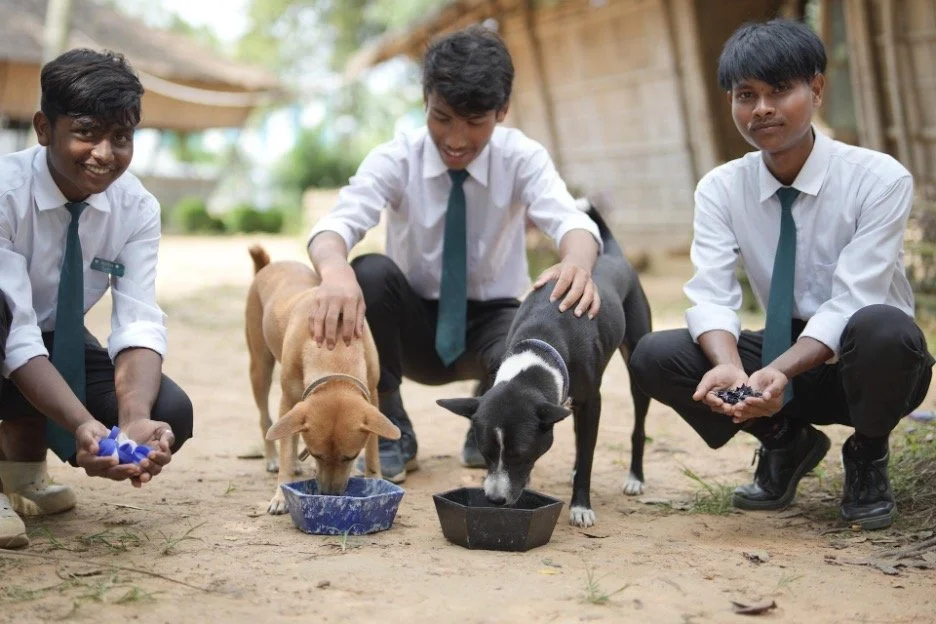the akshar foundation
Phonetic Planet recently took time out to learn about a unique school in India, co-founded by Mazin Mukhtar, who also serves as its Associate Director.
Thanks so much for agreeing to chat with us about The Akshar Foundation, Mazin! Before we focus specifically on the school itself, can you provide a little context for us by sharing a little about the part of the world in which your school is located?
Akshar Forum, our model school, is located in the city of Guwahati, in the state of Assam, in the North East region of India. It is a lush, green, hilly environment, full of bamboo forests and jungle terrain. Our school is located near an elephant corridor, meaning wild elephants regularly travel in the area. Sometimes they travel through our school, causing damage to buildings and walls. But we don't mind, because it's their home that we are sharing with them. Our school is also located near Deepor Beel, a large wetland which is visited by many exotic migratory birds. The climate is tropical, characterized by a dry season in winter, and a wet season in the summer, when the monsoon rains come. During monsoons, the school is often flooded and muddy, and students use stepping stones made of plastic eco-bricks to get from one class to the next.
How long has the school been in operation? What factors led to its establishment?
The school was founded in 2016 with the goal of teaching children who live in poverty how to earn a living, run a business, and take care of their environment. The school functions on the belief that all of the basic needs of the individual need to be met in order to achieve self-actualization and escape cyclic, systemic poverty. Since charity can sometimes lead to dependence, rather than empowerment, students are given the opportunity to earn what they need in school. At-risk teenage students earn currency points by teaching younger students, printing worksheets, maintaining electronics, building furniture, treating injuries, growing food, and recycling plastic, among other jobs. With the principle of “Learning and Earning”, Akshar Forum combines the functions of a school with those of an employment agency, business incubator, and development agency. By addressing education and employment together, blending academics with practical vocational training, we strive to eliminate dropouts and ensure that all students secure gainful livelihoods and contribute to the development of their communities.
Im curious about some of the unique features of your school, and the impact it has on the students, as well as on the wider community.
Akshar Forum’s most innovative feature, Meta-Teaching, is designed to address the problem of dropouts, teacher shortage and lack of parental support. Meta-Teaching is the training and employing of at-risk teens as teachers/coaches for younger students, under the supervision of a senior teacher. We teach students how to teach, and they become better learners in the process. Students are paid for teaching in points, which they exchange for food, clothes, sports equipment, hygiene products and school supplies. This novel approach has yielded many benefits: Firstly, we have eliminated the practice of child labour among our students. Many students who formerly worked in factories, woodcutting and local quarries have opted to earn money by teaching instead. Second, employing teenagers as teachers has enabled us to arrange small classes, comparable to elite schools. This way, children with no parental assistance receive valuable, daily individual mentoring from seniors. And lastly, students acting as mentors become better learners by teaching, gain confidence, work experience, leadership skills, a strong work ethic, and they stay in school.
Beyond training all students as teachers, Akshar Forum also features a number of social enterprises, including a Plastic Recycling Center, Animal Shelter, Solar Power Plant, Landscaping & Organic Produce Market, Print Shop and Woodshop, all designed to provide vocational training to teenage students while simultaneously working towards the development of their own community.
Can you expand a little on the concept of exchanging recyclable materials towards the cost of school fees?
Twice a week, students are employed to collect clean dry plastic from homes and businesses around the school, and teach people to stop burning or dumping their household plastic. They also upcycle the plastic into building materials called Eco-bricks. We also have a Precious Plastic Workshop, with machines including plastic shredders, injection and extrusion machines, where students make new plastic products from waste plastic. They make furniture, keychains, flower pots, dog bowls and more out of used plastic.
Our next move was to ask the parents of our students to send their plastic on the school bus with the kids, but almost none of them would do it. So we told them the school would start charging fees now, but they can pay the fees in plastic. And ever since we implemented the policy of “Plastic School Fees”, we have had 100% participation from parents, and every student brings a bag of clean plastic waste to the school recycling center every single week. Before lockdown, we were collecting about 10,000 plastic packets each month.
Now, we have entered an agreement with the Government of Assam to implement our innovative model in 100 government schools. Each school will implement the “Plastic School Fees” policy, and each school will be equipped with a Plastic Recycling Workshop where students will learn about plastics and how to make new products. We hope to spread this model to every government school in India and beyond. We hope that many people will join us in this mission.
It’s a fascinating concept, Mazin, and it has clearly been successful on a number of levels! On behalf of the Phonetic Planet community, I wish you and your school a bright and prosperous future. Before we finish, can you please share any links to social media accounts relating to your school that you would like our readers to know about?
Yes, of course! You can find out more about us via our website, Instagram account, and Facebook page.




